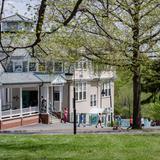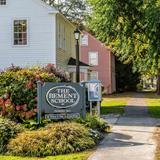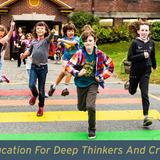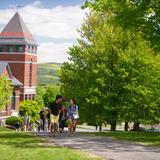The Hartsbrook School offers students an educational experience that stimulates the imagination and awakens a joyful love of learning.
Founded in 1981, the Hartsbrook School is a Waldorf school where education uses innovative teaching approaches and a developmental curriculum integrating arts, sciences and humanities.
Its growing popularity has made it the fastest growing independent school movement in the world with over 1000 schools worldwide and more than 175 schools throughout the United States.
Located on 52 acres of lush green land in Hadley, Massachusetts, the main campus offers a stunning view of local farms with the Holyoke Range to the south.
The Homestead, Land stewardship Program is home to sheep, goats, chickens, rabbits, vegetable and flower gardens.
Our youngest students enjoy the beautiful and home-like environment of the early childhood building, , with a large play yard, gardens and flowering trees.
Quick Stats (2025)
- Top Ranked MA School
- School Type: School with Special Program Emphasis
- Grades: Prekindergarten-12
- Enrollment: 277 students
- Average class size: 18 students
- Application Deadline: None / Rolling
- Source: Verified school update
Top Rankings
The Hartsbrook School ranks among the top 20% of private schools in Massachusetts for:
Category
Attribute
Student Body
School Overview
School Type
Religious Affiliation
Grades Offered
Grades Prekindergarten-12
Year Founded
1981
Student Body
Total Students
277 students
Student Body Type
Co-ed
% Students of Color
13%
State avg.: 29%
Students by Grade
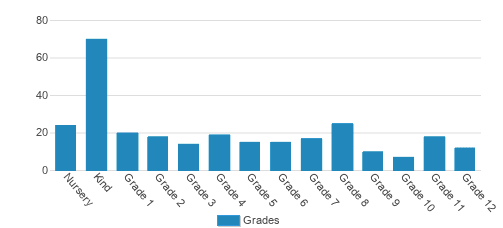
Academics and Faculty
Total Classroom Teachers
43 teachers
Student : Teacher Ratio
6:1
National avg.: 13:1
Average Class Size
18 students
Tuition and Acceptance Rate
Admission Deadline
None / Rolling
Tuition Notes
Nursery - $5,100-$10,080
Kindergarten - $7,825 - $13,600
Grades 1-8 - $13,600
High School - $19,200
% on Financial Aid
30%
Admissions Director
Leslie Evans
Admissions Associate
Christine Sirard
Sports
Total Sports Offered
14 sports
School Notes
- Waldorf Education: An Introduction What is Waldorf Education Teachers in Waldorf schools are dedicated to generating an inner enthusiasm for learning within every child... allowing motivation to arise from within and helping engender the capacity for joyful lifelong learning. For the Waldorf student, music, dance, and theater, writing, literature, legends and myths are not simply subjects to be read about, ingested and tested. They are experienced. Through these experiences, Waldorf students cultivate a lifelong love of learning as well as the intellectual, emotional, physical and spiritual capacities to be individuals certain of their paths and to be of service to the world. Developed by Rudolf Steiner in 1919, Waldorf education is based on a profound understanding of human development that addresses the needs of the growing child. Waldorf teachers strive to transform education into an art that educates the whole child—the heart and the hands, as well as the head. When you enter a Waldorf school, the first thing you may notice is the care given to the building. The walls are usually painted in lively colors and are adorned with student artwork. Evidence of student activity is everywhere to be found and every desk holds a uniquely created main lesson book. Another first impression may be the enthusiasm and commitment of the teachers you meet. These teachers are interested in the students as individuals. They are interested in the questions:
- How do we establish within each child his or her own high level of academic excellence
- How do we call forth enthusiasm for learning and work, a healthy self-awareness, interest and concern for fellow human beings, and a respect for the world
- How can we help pupils find meaning in their lives Teachers in Waldorf schools are dedicated to generating an inner enthusiasm for learning within every child. They achieve this in a variety of ways. Even seemingly dry and academic subjects are presented in a pictorial and dynamic manner. This eliminates the need for competitive testing, academic placement, and behavioristic rewards to motivate learning. It allows motivation to arise from within and helps engender the capacity for joyful lifelong learning. The Waldorf curriculum is broad and comprehensive, structured to respond to the three developmental phases of childhood: from birth to approximately 6 or 7 years, from 7 to 14 years and from 14 to 18 years. Rudolf Steiner stressed to teachers that the best way to provide meaningful support for the child is to comprehend these phases fully and to bring "age appropriate" content to the children that nourishes healthy growth.
Source: Verified school update
Frequently Asked Questions
What sports does The Hartsbrook School offer?
The Hartsbrook School offers 14 interscholastic sports: Alpine Skiing, Basketball, Bowling, Crew, Dance, Equestrian, Fencing, Field Hockey, Kayaking, Mountaineering, Snowboarding, Soccer, Tennis and Ultimate Frisbee.
What is The Hartsbrook School's ranking?
The Hartsbrook School ranks among the top 20% of private schools in Massachusetts for: Largest student body.
When is the application deadline for The Hartsbrook School?
The application deadline for The Hartsbrook School is rolling (applications are reviewed as they are received year-round).
School Calendar
View the The Hartsbrook School yearly calendar below.
School Reviews
5 2/26/2020
"Preparing our children for the future" can mean a lot of things, depending on your view of what the future holds. Harts brook's approach covers the preparation for every future my wife and I can imagine, by including connection to earth, connection to community, academic / arts / music / language integration, and a beautiful way of building our children's self esteem. What a gift this school is to our family, and to this community!
5 6/9/2015
My children are truly thriving here! Love it! Creative, academic, healthy kids!
Endorse The Hartsbrook School. Endorsements should be a few sentences in length. Please include any comments on:
- Quality of academic programs, teachers, and facilities
- Availability of music, art, sports and other extracurricular activities
- Academic or athletic awards
Recent Articles

A Parent's Guide To Understanding High School Teaching Methods
This comprehensive guide helps parents navigate the various teaching methods used in today's high school classrooms. By understanding these approaches, you'll be better equipped to support your teen's learning journey, communicate effectively with teachers, and create a complementary learning environment at home.

February 08, 2025
Social Emotional Learning: Education's Hidden SymphonyA musician's perspective on Social Emotional Learning reveals how this educational framework orchestrates success through five essential emotional competencies.

January 24, 2025
A Roadmap For Starting A Private SchoolUse this roadmap as a set of talking points with your trusted mentors and professionals to start the private school of your dreams. You're not alone. Over the years, hundreds of folks like you have had the same dream. From Quintilian to Maria Montessori to Lucy Madeira Wing, visionary educators have established schools to teach according to their beliefs and methodologies.

